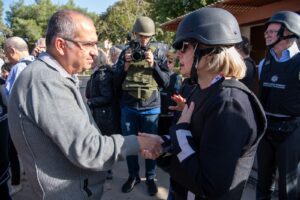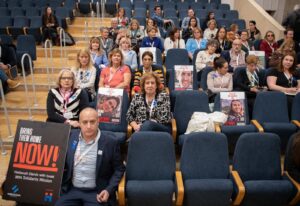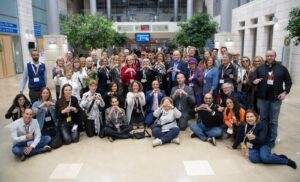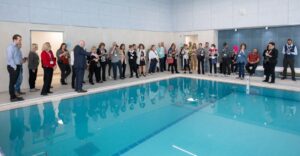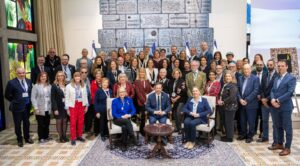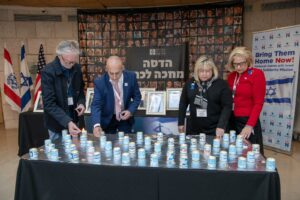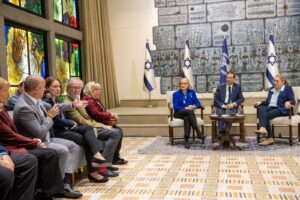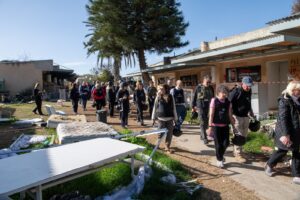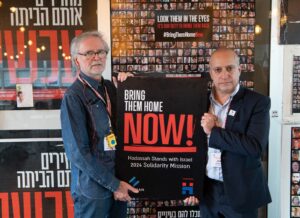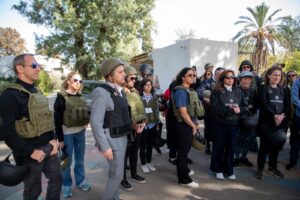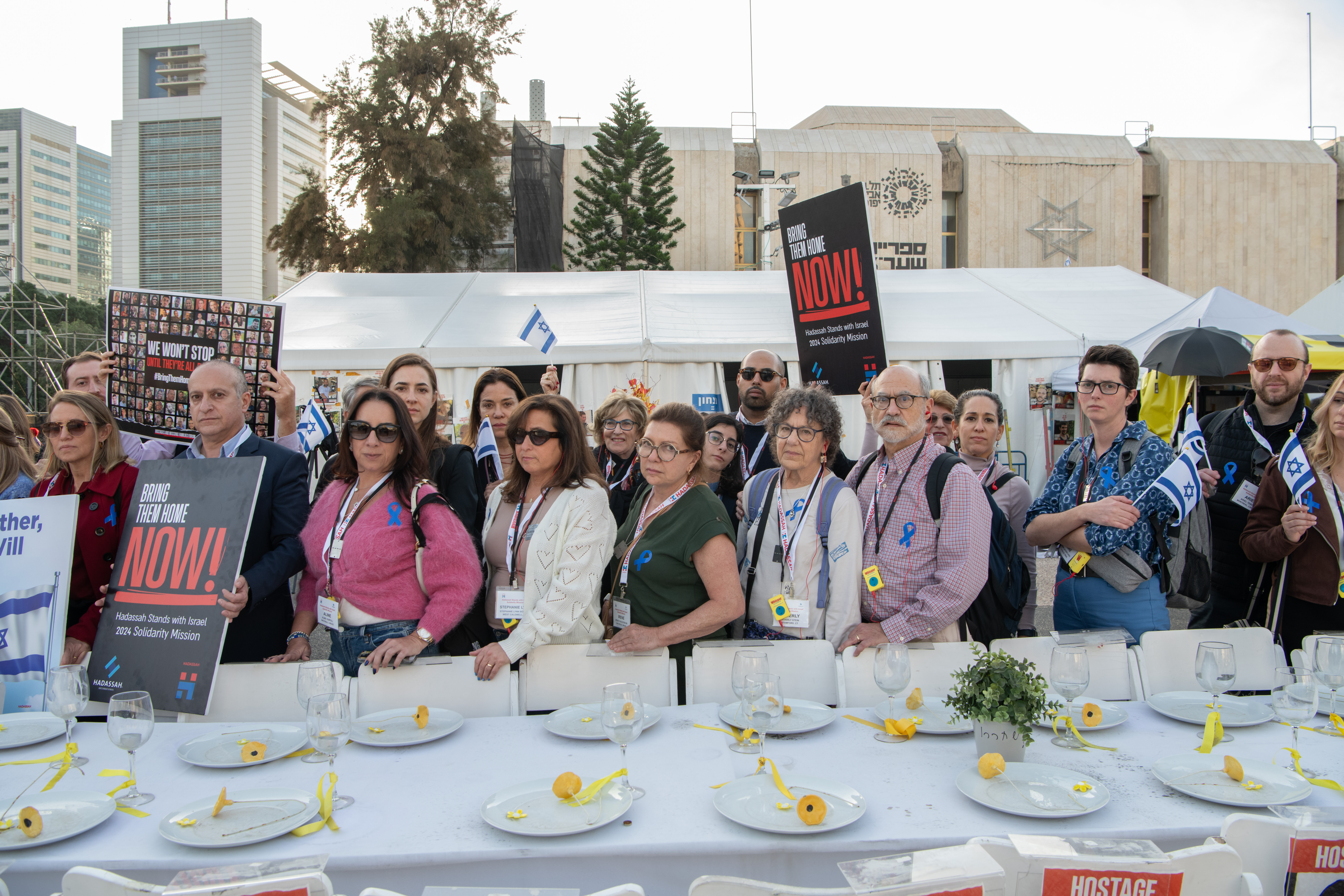
Despite these dark times of war, Hadassah around the world and in Israel remains proud and strong. Nearly 50 Hadassah volunteers and staff from eight countries felt compelled to come on a Mission to bear witness and express their solidarity with Israel. Led by Carol Ann Schwartz, the new National President of Hadassah, The Women’s Zionist Organization of America (HWZOA), and Rhoda Smolow, immediate former President of HWZOA, the delegation included men and women from the USA, Israel, Argentina, Brazil, Mexico, Canada, France, and Switzerland.
They also came to learn how they and other Hadassah volunteers around the globe can help Israel and the medical staff at Hadassah Medical Organization (HMO) who remain on the frontline, caring for soldiers, civilians, and families affected by the conflict. After three months of incredible work that has raised awareness and donations from afar, the volunteers arrived in Israel. They came committed to bear witness to both the war effort (that currently extends even beyond the IDF) and the results of their generous input tireless efforts as it is transformed into tangible help for those who need it..
DAY 1: EXPRESSING SOLIDARITY WITH THE KIDNAPPED HOSTAGES AND THEIR FAMILIES.
The Mission started in Tel Aviv with the pain and anguish of the families of those still held hostage in Gaza by Hamas.
Prior to meeting with families of the hostages in “Hostages Square”, the heads of the delegation submitted a petition containing 5,000 signatures to the International Committee of the Red Cross (ICRC) demanding that ICRC representatives visit the Israeli captives of Hamas in Gaza, and stop ignoring these hostages who are being held in inhumane conditions and who are suffering physical, psychological, and sexual abuse.
With aching hearts, participants heard the stories of some of the hostages as told by their families, and learned what the families are doing to bring their loved ones home as soon as possible. The aunt of Yagev Buchshtab, a 34 year-old hostage still held in Gaza, talked about how the forum for the hostages’ families was formed. There was not one dry eye left in the room when she told the story of her nephew’s abduction. Yagev and his wife wrapped each other in a tight embrace, so tight that the terrorist could not separate them and decided to load them onto a truck together. Yagev, a musician, saw his favorite guitar being stolen and told his wife, who was released from captivity during the deal, that if there is one child in Gaza who will experience joy while listening to music that he would be content. His wife, aunt, and whole family are expecting him home now.
Eylon Levy, Government of Israel Spokesperson told the mission: “The difficult thing is coming to Israel on a solidarity visit and bearing witness to the atrocities of October 7th. You offer an attentive ear and a peaceful shoulder to the families of the hostages and the victims. This isn’t a war for Israel alone but for the Jewish people everywhere. This is a critical moment for the Jewish people and for humanity.” Eylon’s well known charisma in social media definitely struck an effect in the crowd: some were even asking for “selfies”, others were intrigued to learn his strategy for efficient communication. The volunteers were amazed when his answer included teaching the next generation how to debate, as argumentation and discussion can be trained like a muscle.
DAY 2: SUPPORTING THE HADASSAH MEDICAL ORGANIZATION AS IT RESPONDS TO ISRAEL’S URGENT MEDICAL NEEDS.
The Hadassah Solidarity Mission then turned to learning how the Hadassah Medical Organization (HMO) has responded to the war, and what it will need in the future to take care of the victims of the war.
HMO has been at the forefront of medical efforts, treating hundreds of severely wounded patients and conducting over 140 surgeries in the days immediately following October 7th.
To ensure secure continuous care, underground emergency facilities have been established on both Hadassah hospital campuses, enabling treatment of more than 300 patients, including up to 60 who might require intensive care.
“It is the combination of human attitude, brain power and innovative technologies that makes Hadassah such a pioneer of Health in Israel,” explained Jorge Diener, Executive Director of Hadassah International.
Expanded Rehabilitation facilities are urgently needed at Hadassah Hospital at Mount Scopus:
The two buses bearing Solidarity Mission participants drove up to the Hadassah Hospital on Mount Scopus. It was a bright sunny day, in which the light shone inside every corner of the new facility, giving a beacon of hope for new beginnings.
As the number of patients requiring rehabilitation have dramatically increased due to the war, donations from Hadassah supporters globally are allowing HMO to fast-track construction of this large eight story new facility. Scheduled to open for patients in January, the much-needed departments for inpatients, physiotherapy, occupational therapy, and hydrotherapy will be available immediately.
Mission participants were privileged to hear from Hadassah patient Sagi who lived with his family on Kibbutz Beeri. On October 7, terrorists entered their house, shot them through the door of their shelter, and set their house on fire. Sagi was badly burned on his feet, arms, face, and back. Brought to Hadassah’s hospital at Ein Kerem, Sagi was treated for his burns for three weeks and is now undergoing rehabilitation at Hadassah Mount Scopus.
Dr. Emmanuel Messas, President of Hadassah France, said he was proud to support the greatly needed Gandel Rehabilitation Center—the only one in Jerusalem—particularly because it will serve all the people regardless of their financial capabilities.
The Mission took the opportunity to thank the Australian Gandel family and the Gandel Foundation again for their generous donation to the Gandel Rehabilitation Center.
Hadassah Hospital at Ein Kerem:
The Solidarity Mission members then traveled across Jerusalem to the Hadassah hospital at Ein Kerem to see and hear for themselves how the Hadassah Hospital at Ein Kerem and its amazing staff have responded to the war.
Led by Prof. Yaniv Sherer, Director of Hadassah Ein Kerem, a panel consisting of Dr. Shiri Ben-David, Head of Psychology; Dr. Esie Sharon-Sagi, Director, Postgraduate Program in Prosthodontics, Faculty of Dental Medicine, The Hebrew University-Hadassah School of Dental Medicine; and Dr. Yoav Hershkovitz, Intensive Care Unit, Hadassah Ein Kerem, shared their unbelievable and incredible work. They spoke about treating wounded soldiers at the Gaza border and in the Hadassah Hospitals, identifying burned victims just by their teeth, and providing mental health support while suffering from trauma themselves.
While visiting Hadassah patient Eliezer, who was badly burned by an antitank missile, Eliezer and his family told the mission participants how grateful they are for the life-saving treatment he has received at Hadassah.
Participants were then shown the underground protected areas of Hadassah Ein Kerem with its Underground Surgical Center, the Emergency Neonatal Intensive Care Unit, and the Emergency Hospital by Mr. Yuval Adar, Hadassah CFO and Prof. Yoram Weiss, Hadassah Director General.
Dr. Ahmad Nama, Director of Hadassah Ein Kerem’s Center for Emergency Medicine, gave the Mission participants a tour of the Hadassah Trauma Center and explained the challenges he has been confronted with since the beginning of the war.
DAY 3: MEETING THE PRESIDENT OF ISRAEL AND TRAVELING TO THE GAZA BORDER TO BEAR WITNESS TO THE DEVASTATION OF THE TERRORIST ATTACK ON OCT 7th.
The President of Israel:
Solidarity Mission participants met President of Israel Isaac Herzog and First Lady Michal Herzog in the presidential residence in Jerusalem. After inquiring about the level of antisemitism in their own countries, President Herzog told the mission participants that “Israel has a long journey of healing ahead. We are enduring horrific personal & national traumas. Your support for Israel’s healthcare, and solidarity with the Israeli people is a great strength for all of us.”
Traveling to the Gaza Border to bear witness:
From Jerusalem, two bullet-proof buses transported the mission members, equipped with protective vests and (optional) helmets, to Kibbutz Aza close to the border with Gaza. Kfar Aza lost 62 people on October 7. Nineteen people were taken hostage. Of these, 11 have returned. Five people, including two women, are believed to still be held by Hamas.
At Kfar Aza, an IDF spokesperson told the stories of those who were murdered on October 7th , particularly the kibbutz leaders who were targeted—their homes mapped by Gazans who’d worked in the kibbutz and enjoyed home hospitality there. The worst buildings were those of the unmarried students—decimated and full of bullet holes. They still smelled of burned wood.
The group then traveled to Kibbutz Nir Am, near Sderot. Waiting for them was HMO head of Pediatric Cardiology Dr. Sagui Gavri, a third-generation kibbutznik. He described the successful defense of the kibbutz and how he protected his home with a rifle and a pistol until the army eventually allowed his family to leave the kibbutz. “We were told to drive with high lights and to have our son stay low on the floor so he couldn’t be seen and couldn’t see out. Everywhere we looked were burned cars and dead bodies.”
The last stop was the memorial site of the attack at the Nova Festival, an outdoor party that was attacked by Hamas, killing 364 and wounding many. More than 40 hostages were taken. Memorial photos of the dead and missing are on poles in the field. Mission members lit candles, said kaddish and sang Hatikvah.
After a somber ride back to Jerusalem, the evening focused on survivors. Special guests Michal and Omri Elon told how Michal, a nurse who had worked as a nurse at Hadassah Ein Kerem, was shot at the Zikim army base on the border of Gaza while saving the life of a woman soldier, who happened to be the daughter of a Hadassah doctor. Michal is currently in rehabilitation at Mount Scopus, along with Omri’s brother who was shot while serving as a soldier in Gaza.
DAY 4: “BREAKING THE SILENCE” ON RAPE:
Shari Greenwald Mendes, who volunteers for the IDF reserve unit tasked with preparing the bodies of fallen female soldiers for burial, was the lead speaker in the Hadassah Solidarity Mission’s panel “Breaking the Silence” which focused on rape and gender mutilation by Hamas on October 7 and afterwards. She told Mission participants that “The scale of the task before us and the condition of the bodies was difficult to cope with. We saw the crimes of humanity before our eyes.”
Law professor Cochav Elkayam Levy, who heads the Civil Commission on October 7 crimes by Hamas on Women and Children reassured the group that every piece of evidence is being saved and archived.
Hadassah’s Dr. Devorah Bauman, the Hadassah gynecologist who heads the Bat Ami Center for Sexual Abuse at Hadassah Ein-Kerem talked about the ongoing damage to women’s psyches from sexual abuse, while Hadassah Mount Scopus Director Tamar Elram, who is also a gynecologist, spoke about pioneering more sensitive treatment for rape victims.
After four days of heart-wrenching eye-witness accounts, visits to sites of incomprehensible evil and many, many tears, the Hadassah Solidarity Mission came away believing that there can be a way forward if the world knows the truth about October 7 and all that has followed.

